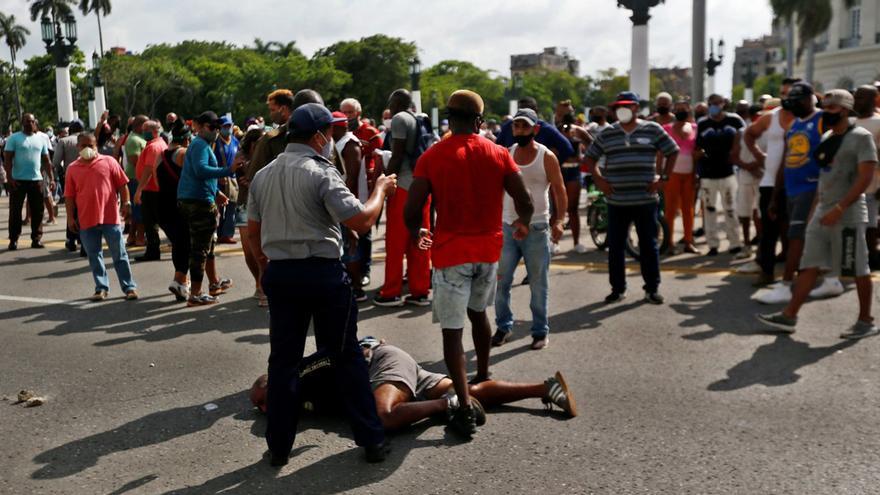
![]() 14ymedio, Havana, May 29, 2023 – The Cuban regime admitted to arresting and prosecuting 39 minors, and sentencing six adolescents aged 16 to 18 years old to prison, after the protests of the July 11th, 2021 (11J). The data are part of a government report dated December 30th, 2022, presented by the Diplomatic Mission of Cuba to the Committee on the Rights of the Child in Geneva. On Monday, Prisoners Defenders (PD) called attention to the recent publication, unknown until now.
14ymedio, Havana, May 29, 2023 – The Cuban regime admitted to arresting and prosecuting 39 minors, and sentencing six adolescents aged 16 to 18 years old to prison, after the protests of the July 11th, 2021 (11J). The data are part of a government report dated December 30th, 2022, presented by the Diplomatic Mission of Cuba to the Committee on the Rights of the Child in Geneva. On Monday, Prisoners Defenders (PD) called attention to the recent publication, unknown until now.
In the report, the Government accused the committee of maintaining “a profound ignorance to the reality of the country and the vast protection and promotion of child and adolescent rights in Cuba.” Immediately afterwards, it revealed its “opinions” regarding a complaint by Geneva against the regime in May 2022, which demanded accountability with regard to compliance with the rights of minors in Cuba, following the wave of repression unleashed by the 11J protests, a date on which, the report states, “extremely serious violent actions and crimes” were carried out against state security.
“Four hundred eighty-eight people have been sanctioned, including 39 young people between the ages of 16 and 18 years, primarily for the crimes of sedition, sabotage, armed and violent robbery, assault, contempt, and public disorder,” the report summarizes, almost at the end of the document. In addition, it confirms that “the sanctions of deprivation of liberty befell upon 383 of the accused, considering the severity and circumstances in which the events occurred, their level of participation and personal conduct; among them 6 young people aged between 16 and 18 years.”
However, the document by Cuba’s Permanent Mission to the UN in Geneva insists that “the age for a subject to be considered criminally responsible is 16 years of age, as established in the current Criminal Code” on the Island. “As such, in Cuba there aren’t any minors younger than 16 years who have been subjected to judicial proceedings, regardless of the result or severity of their actions.”
The report acknowledges that another 105 protesters who were tried had their prison sentences commuted to correctional labor, and 33 young people between the ages of 16 and 18 years were among them, “11 were sentenced to correctional labor with internment and a similar number were sentenced to correctional labor without internment and limited freedom, respectively.” The latter, it states, were under surveillance to achieve “rectification of conduct” and “social reintegration”.
The text alleges that Cuban authorities respect “the freedom of assembly, protest and association,” including that of children and adolescents but only for “legal purposes” and they are not opposed to “observing the precepts” established by the law.
Particularly bothersome for the authorities, states the document, was the Committee’s observation that “several children, some as young as 13 years, were violently arrested, taken from their homes during the night without informing their families of their whereabouts, detained, isolated and transferred to different locations to be interrogated for long hours.”
As for the minors younger than 16 years, it states they “receive decriminalized treatment and administrative measures are available for their reorientation, specialized and individualized education” in ’special centers’.
PD, in its commentary on the report, denounced that “the centers for minors belong to the Ministry of the Interior, not the Ministry of Education. They are prisons,” and adds that the document does not specify what treatment was given to those younger than 16 years.
The report admits that “for cases comprising those between 16 and 18 years of age, they exercise strict observance of the Criminal Procedures Law, in place since January 1, 2022,” which assumes they are treated with the same degree of rigor as those outside that age range, although they are promised “special treatment” during the trial.
On May 11, PD denounced that as of the end of April Cuban prisons held 1,048 political prisoners and prisoners of conscience. Although that is 18 fewer than in March, the Madrid-based organization highlighted in its last monthly report that the the number of cases of minors “have flourished”.
The organization stressed an increase in the number of incarcerated minors, which totaled 35 in April (two more than in March.) Of these, four are girls, serving sentences or being processed. The organization highlighted that a “good portion” are held in penitentiary centers the government refers to by the euphemism Integrated Education Schools.
At least 18 adolescents were charged with or convicted of sedition, one of the most severe charges in the Criminal Code used by the regime to punish the 11J participants. “The median penalty for these convicted minors is five years deprivation of liberty, a punishment which is, on average, greater than that suffered by adults in political prison prior to 11J,” states PD.
Translated by: Silvia Suárez
____________
COLLABORATE WITH OUR WORK: The 14ymedio team is committed to practicing serious journalism that reflects Cuba’s reality in all its depth. Thank you for joining us on this long journey. We invite you to continue supporting us by becoming a member of 14ymedio now. Together we can continue transforming journalism in Cuba.
